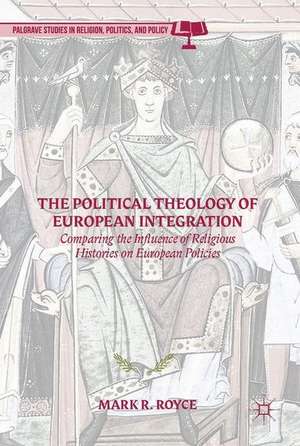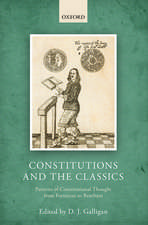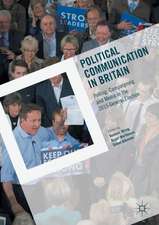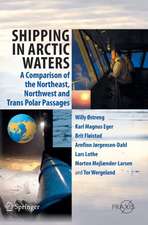The Political Theology of European Integration: Comparing the Influence of Religious Histories on European Policies: Palgrave Studies in Religion, Politics, and Policy
Autor Mark R. Royceen Limba Engleză Hardback – 11 iul 2017
| Toate formatele și edițiile | Preț | Express |
|---|---|---|
| Paperback (1) | 780.06 lei 6-8 săpt. | |
| Springer International Publishing – aug 2018 | 780.06 lei 6-8 săpt. | |
| Hardback (1) | 730.79 lei 6-8 săpt. | |
| Springer International Publishing – 11 iul 2017 | 730.79 lei 6-8 săpt. |
Din seria Palgrave Studies in Religion, Politics, and Policy
- 9%
 Preț: 683.50 lei
Preț: 683.50 lei - 15%
 Preț: 637.13 lei
Preț: 637.13 lei -
 Preț: 384.48 lei
Preț: 384.48 lei -
 Preț: 385.62 lei
Preț: 385.62 lei - 15%
 Preț: 640.06 lei
Preț: 640.06 lei -
 Preț: 386.39 lei
Preț: 386.39 lei -
 Preț: 389.70 lei
Preț: 389.70 lei -
 Preț: 396.40 lei
Preț: 396.40 lei -
 Preț: 387.75 lei
Preț: 387.75 lei -
 Preț: 388.72 lei
Preț: 388.72 lei -
 Preț: 389.88 lei
Preț: 389.88 lei - 18%
 Preț: 948.92 lei
Preț: 948.92 lei - 18%
 Preț: 730.65 lei
Preț: 730.65 lei - 18%
 Preț: 950.33 lei
Preț: 950.33 lei - 18%
 Preț: 785.74 lei
Preț: 785.74 lei -
 Preț: 415.95 lei
Preț: 415.95 lei - 18%
 Preț: 790.46 lei
Preț: 790.46 lei - 18%
 Preț: 894.03 lei
Preț: 894.03 lei - 15%
 Preț: 638.11 lei
Preț: 638.11 lei -
 Preț: 486.80 lei
Preț: 486.80 lei - 15%
 Preț: 526.83 lei
Preț: 526.83 lei - 18%
 Preț: 779.89 lei
Preț: 779.89 lei - 15%
 Preț: 466.95 lei
Preț: 466.95 lei -
 Preț: 389.49 lei
Preț: 389.49 lei - 18%
 Preț: 726.55 lei
Preț: 726.55 lei - 18%
 Preț: 776.88 lei
Preț: 776.88 lei - 18%
 Preț: 890.85 lei
Preț: 890.85 lei - 18%
 Preț: 786.52 lei
Preț: 786.52 lei -
 Preț: 396.40 lei
Preț: 396.40 lei - 15%
 Preț: 633.66 lei
Preț: 633.66 lei - 15%
 Preț: 640.37 lei
Preț: 640.37 lei -

-

Preț: 730.79 lei
Preț vechi: 891.21 lei
-18% Nou
Puncte Express: 1096
Preț estimativ în valută:
139.83€ • 146.39$ • 115.71£
139.83€ • 146.39$ • 115.71£
Carte tipărită la comandă
Livrare economică 07-21 aprilie
Preluare comenzi: 021 569.72.76
Specificații
ISBN-13: 9783319534466
ISBN-10: 3319534467
Pagini: 310
Ilustrații: XI, 310 p. 9 illus.
Dimensiuni: 148 x 210 mm
Greutate: 0.54 kg
Ediția:1st ed. 2017
Editura: Springer International Publishing
Colecția Palgrave Macmillan
Seria Palgrave Studies in Religion, Politics, and Policy
Locul publicării:Cham, Switzerland
ISBN-10: 3319534467
Pagini: 310
Ilustrații: XI, 310 p. 9 illus.
Dimensiuni: 148 x 210 mm
Greutate: 0.54 kg
Ediția:1st ed. 2017
Editura: Springer International Publishing
Colecția Palgrave Macmillan
Seria Palgrave Studies in Religion, Politics, and Policy
Locul publicării:Cham, Switzerland
Cuprins
1. From Cross to Constitution.- 2. God and Man in Europe.- 3. A Theologico-Political Analysis.- 4. Theology and Integration.- 5. The Christian Confederalism of Switzerland.- 6. The Lutheran Intergovernmentalism of Norway.- 7. The Protestant Supranationalism of Britain.- 8. The Christian Federalism of Germany.- 9. Conclusion.
Recenzii
“With his thoroughly researched and excellently written book, Royce corrects the political science discourse by explaining how a society’s normative ideas, particularly its theology, can affect international relations, especially in the case of European integration.” (Mark Melton, Providence, December, 2019)
Notă biografică
Mark R. Royce is Assistant Professor of Political Science at Northern Virginia Community College, USA, where he teaches international relations courses. His research interests include European integration, the British Constitution, and Christian theology, and he has written for The European Legacy, International & Comparative Law Quarterly, and Providence: A Journal of Christianity & American Foreign Policy.
Textul de pe ultima copertă
This book traces the connections between diverging postwar European integration policies and intra-Christian divisions to argue that supranational integration originates from Roman Catholic internationalism, and that resistance to integration, conversely, is based in Protestantism. Royce supports this thesis through a rigorously supported historical narrative, arguing that sixteenth-century theological conflicts generated seventeenth-century constitutional solutions, which ultimately effected the political choices both for and against integration during the twentieth century. Beginning with a survey of all ecclesiastical laws of seventeen West European countries and concluding with a full discussion of the Brexit vote and emerging alternatives to the EU, this examination of the political theology surrounding the European Union will appeal to all scholars of EU politics, modern theology, religious sociology, and contemporary European history.
Caracteristici
Challenges common assumptions about the religious underpinnings of the European Union’s founding Analyzes demographics, law, and history to understand wide divergences in European perspectives towards European integration Examines European case studies of religiously-inspired policies and arrangements governing relationships between church and state




